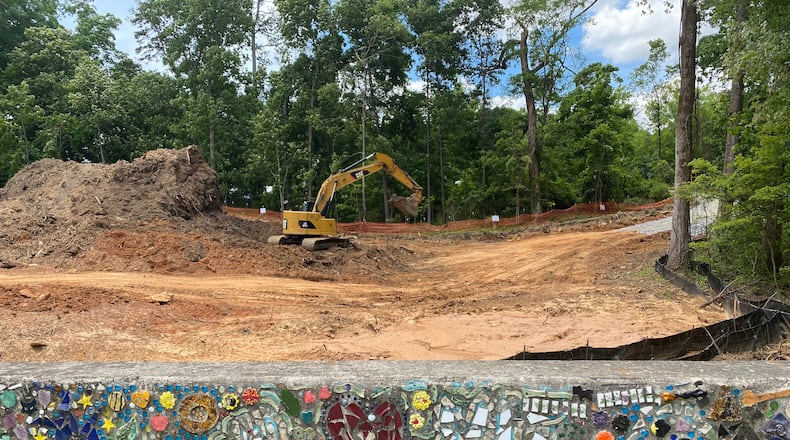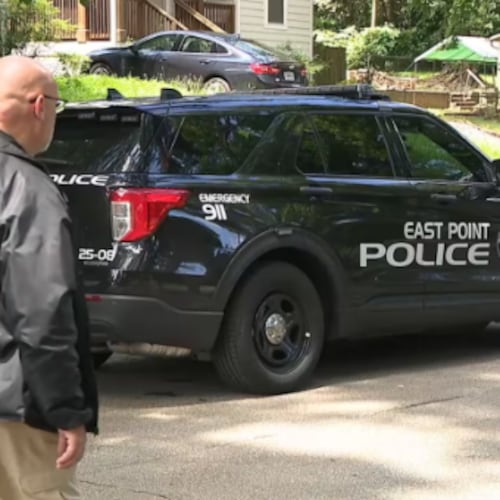Lydia Cobb walked through her tree-filled neighborhood last week and found something unexpected. The tree forest that stood inside a stormwater detention pond was gone, leaving only dirt in the wide space.
“If you walked by before you wouldn’t see a pond there,” Cobb said. “You would see nature. It’s bird nesting season. They’re just destroying something for commercial purposes.”
Roswell had taken down 50 trees to expand the pond space for stormwater. Cobb and other residents nearby complained they were blindsided by the move and they’re raising questions about the city’s process leading up to the project.
City officials say they needed to enlarge the detention pond for stormwater flowing from the planned Southern Post mixed-use project and an adjacent hotel. Roswell approved a $768,000 contract with The Dickerson Group in January to expand the pond.
The detention pond is 1.2 acres located on Forrest Street behind Roswell Cultural Arts Center. The earlier drainage pond had been supported by a 150-foot mosaic wall across the front of the tree-filled space.
The pond project includes installing a maintenance access road to the bottom of the pond, dredging and re-grading the existing pond, demolishing part of the existing retaining wall and extending the wall to the south and southwest to increase storage capacity. Work is expected to be completed in July.
Roswell Environmental and Public Works Director Dan Skalsky said the pond was overdue for maintenance and the trees posed a potential problem of clogging leaves and tree limbs after a rainfall.
“We’re not supposed to have trees growing in a detention facility like that,” he said.
Several Roswell residents discussing the pond on the Nextdoor social media site said they support the reconstruction of the pond because it helps the environment. Others chimed in with concerns about the importance of trees for the environment.
Council members said they rely on Skalsky’s opinion about pond maintenance.
“My understanding is it has to be maintained,” Councilman Matthew Tyser said. “It was overgrown and had a lot of issues. Hopefully when (the work is) done they will make it attractive. It’s surrounded by other tree growth. It might be nice.”
Officials have held several detailed public discussions on the project since 2019 in Public Works committee meetings, which were streamed online and remain there for viewing. However a check of city agendas reveals the work was never discussed at City Council meetings. Instead, it was approved without comment.
This includes approval of the $768,000 contract in January with The Dickerson Group to reconstruct the stormwater detention pond.
Skalsky said he advised the city administrator to place the detention pond matters on the City Council’s “consent agenda,” which is a list of items that can be approved without discussion during public meetings. Skalsky said it’s a judgment call on what are considered noncontroversial decisions.
A resident and environmental advocate, Cobb said she would have liked to take part in a community meeting about the pond forest.
“My concern ... is could we have looked at options other than cutting down those trees?” Cobb said.
First Amendment and government transparency attorney Sarah Brewerton-Palmer confirmed Roswell had followed Open Meetings Act requirements.
“That said, if citizens feel surprised by the Council’s action here, it may warrant the Council taking a hard look at their use of the consent agenda process,” Brewerton-Palmer added. “... If they make any changes in the process here, it would just be a matter of good governance and not legal requirements.”
Skalsky said that although the trees are gone there will be planting of shrubs and plants to make the area attractive when the project is complete. In the meantime he said, “It’s a disruption, there is no question about that.”
About the Author
Keep Reading
The Latest
Featured





